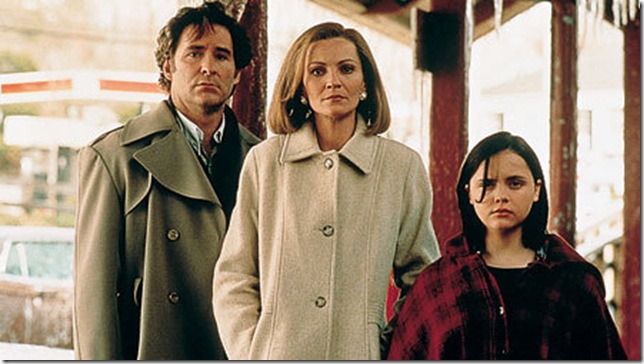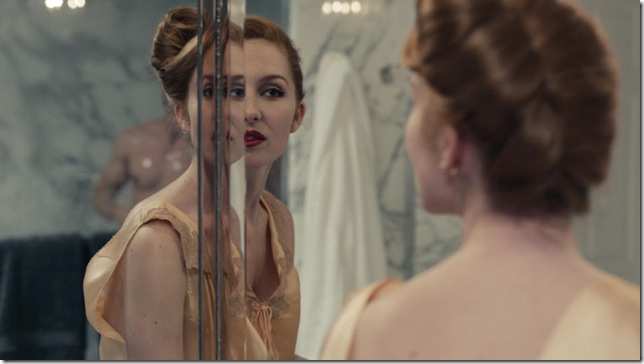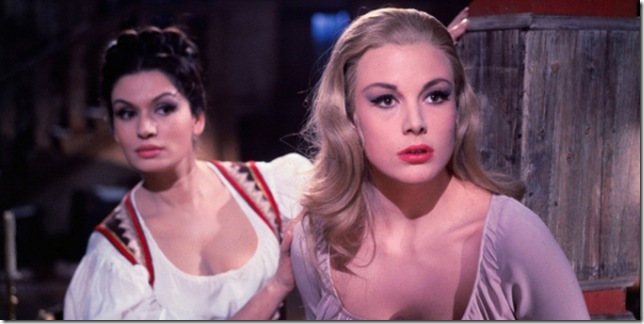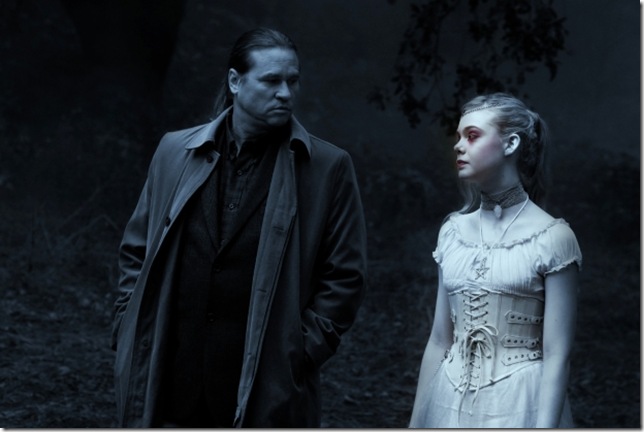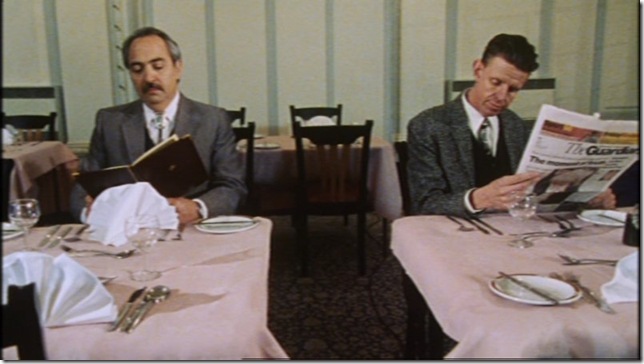The ice storm in The Ice Storm (Criterion, $34.99 Blu-ray, $30.27 DVD) creeps up gradually and almost innocuously on its characters, who seem to pay it little mind as it coats their Connecticut town in dripping stalactites – at least until it takes one of their own in the film’s unforgettable climax. But there are plenty of warning shots, for the lost souls captured in the film’s delicate tapestry and for the movie’s attentive viewers, that signals the breakage to come.
Every now and then, director Ang Lee will show us close-ups of blocks of ice fracturing from their freezer trays into messy shards, or molded spheres of ice plunking into drinks during a damnable cocktail parties. The ice corrodes and melts, much like the two family units at the film’s center, whose decline into disrepair might only be reversed by a human sacrifice.
The Ice Storm hit theaters in 1997, two years prior to the Oscar-winning American Beauty. It was not nominated for a single Academy Award, but I find it a richer study of suburban malaise and unspoken despair than Sam Mendes’ hyper-stylized floral nightmare.
Kevin Kline is married to Joan Allen, who’s as chilly toward his sexually advances as the titular storm. So he begins an affair with his best friend’s wife, Sigourney Weaver, who is also married, all while lecturing his witty, jaded daughter Christina Ricci not to experiment with Weaver’s son, Elijah Wood: Monkey see, monkey don’t. Meanwhile, Kline’s son, Tobey Maguire, is returning home from boarding school for Thanksgiving, though he can only think about Katie Holmes, the dreamy Bad Girl in his literature class.
There are wayward emotional and sexual decisions, relationships that are built and destroyed, and journeys that traverse impenetrable environs, all of which are not this film’s exclusive terrain. What makes The Ice Storm stand apart still, a decade and a half later, is its setting, which imbeds a specific atmosphere into the film’s fabric. Based on Rick Moody’s novel, the story is set in 1973, and one of the first images we see is Richard Nixon attempting to justify Watergate on TV; later, Ricci will don a frightening mask of Tricky Dick during one of the strangest seduction scenes in film history.
The Ice Storm’s milieu of early ’70s angst and cynicism is not on example of background noise or nostalgia but an elemental commentary on a new era of decaying morals, from the White House down to the white houses of suburbia. There are plenty of laugh-out-loud moments amid The Ice Storm’s gallows humor, but their aftertaste stings like alcohol on an open wound, always leaving us pondering how we would handle the same situations, trapped in a country where deceit and hypocrisy trickle down from the very top. The Ice Storm is a movie about quintessential American disappointment as much as two families in upper-middle-class Connecticut. They are just the meteorites broken off from a hurtling mass of Decline.
The first incredible moment in Kiss of the Damned (Magnolia, $19.99 Blu-ray, $14.99 DVD) occurs in its prologue, when two people meet in a video store. Seriously, a video store? A small, independent one, too, like they used to have in the ’90s. In fact, the film’s lead character, the ginger-haired bombshell Djuna (Josephine de la Baum), receives a telephone reminder to return overdue videos, and it’s in near the Thriller section that she bumps into the scruffy, determined screenwriter Paolo (Milo Ventimiglia).
He follows her out, they go to a bar, they chat – partially about her unusual “skin condition” which doesn’t allow to her experience sunlight – then head back her place, where she ushers him away in the throes of passion, just as the pheromones make her fangs pop out. Yes, folks, she’s a vampire, and he’ll soon become one too, after she turns him. For a while it’s a charmed life of constant fornication and feeding on wild animals, but their idyllic night-stalking romance hits a snag in the form of Djuna’s deviously attractive, trampy sister Mimi (Roxane Mesquida), also a vampire, who can’t help but propel Paolo’s wandering eye.
Kiss of the Damned channels the vampire mythos through the trashy lens of The Jerry Springer Show, and it’s devoid of even perfunctory performances from its leading men and women, with the inept and awkward Mesquida plunging the entire venture into unintentional parody. It’s a shame, because director Xan Cassavetes (daughter of the great John), in her feature-film debut, has a strong command of style, creepily inserting a soundtrack of foreboding throbs over scattered images of the vampires’ hunting and gathering. But after all the vampire fiction we’ve been bombarded with in the Aughts, Cassavetes’ sexy, bloody narrative offers little distinction from her contemporaries, and consequently it feels at least eight years past its time. Compared to the admittedly faltering True Blood, Kiss of the Damned is amateur hour. With Michael Rapaport, in a funny cameo as Paolo’s agent.
Vampires also play into one of three short films comprising Mario Bava’s 1963 horror triptych Black Sabbath (Kino, $19.99 Blu-ray), an alternately chilling and guffaw-worthy xample of the giallo genre that gave Ozzy Osbourne his band name. “Telephone,” the first of the entries, is a tense, 30-minute chamber piece about a beautiful woman harassed via phone by an initially unidentified psychopath, a scenario Wes Craven later adopted for the iconic prologue to Scream. As a narrative device, there’s still something uniquely potent about an object as benign and necessary as a telephone acting as a receptacle for terror.
Next up is “The Wurdalak,” a meretricious gothic nightmare about the titular creatures – aka vampires – rising from their newly buried graves to suck the blood of their loved ones. Boris Karloff delivers a schlocky, grandiose performance as one of the menacing wurdalaks, but the more you stick with this story, the more unsettling it becomes. Three generations of a family are torn apart by vampirism, but because the wurdalaks still look like their former selves, they’re gained easy entry into the hearts and minds of the still-living, and the result is emotionally devastating, if not especially scary.
The film concludes with the breeziest and silliest entry of the bunch, “Drop of Water,” concerning a spiritual conjurer who terrorizes her nurse from beyond the grave. Meh – aside from a few laughs at the expense of this short, it’s hardly worth consuming. But stick around until the very end, where we revisit with Karloff in a classic last shot in which Bava pulls back his cameras to reveal the artifice of his set design and special effects, revealing that this master of horror doesn’t always take himself seriously.
And since we’re still speaking of vampires, none other than Francis Ford Coppola has also bit into yesterday’s flavor of the week with Twixt (Fox, $19.96 Blu-ray, $14.99 DVD), some 20 years after directing his memorable version of Bram Stoker’s Dracula. This time, there are no characters – nor a story – quite so glamorous.
It stars a shockingly puffy Val Kilmer – resembling Steven Seagal’s late-period doppelganger, complete with ponytail – as Hall Baltimore, a mystery writer who, like many pitiable protagonists, has joined the ranks of the Previously Promising. Hawking his latest witchcraft novel to an indifferent small town, he stumbles on a hotel once frequented by Edgar Allan Poe, and it’s not long before the mustachioed master visits the doughy writer in his dreams – to say nothing of the colony of vampires, ghosts and dancing belfry custodians who frequent his hypnagogic hallucinations.
For a while, Twixt is intriguing, in a strange, Twin Peaks-y sort of way. The characters, whether in the nearly sepia-toned real life or in Hall’s strikingly monochromatic dreamworld, say and do the darnedest things, from the small town’s eccentric sheriff (Bruce Dern) to Hall’s metaphor-mixing agent (David Paymer). And any film that opens with voice-over narration from Tom Waits is on the right track from square one. Where Twixt veers off the line is that, like the blocked writer at the film’s center, it doesn’t know where to go.
Coppola’s own screenplay flounders and falters through so much banal earthbound folderol that we begin to count the minutes until Hall’s next visit to the sandman, where at least the daring mix of black-and-white with the occasional punctuation of color provides a visual feast. A lot of stuff happens in Twixt, but it’s a plodding and meandering 88 minutes of aimless B-movie esoterica from a director who once thought large and now doesn’t seem to be thinking much at all.
On the other hand, if you want to see strange done right, don’t miss Three Businessmen (Microcinema, $14.99), an underrated turn-of-the-century comedy from renegade director Alex Cox. Miguel Sandoval and Cox play Benny and Frank, art dealers from New Mexico and London, respectively, who meet in an unusual Liverpudlian hotel. Benny is assigned the “Jacuzzi suite,” which has no Jacuzzi, and he meets Frank at the hotel restaurant, which seems to serve no food. In fact, they seem to be the only chaps in the entire cavernous dwelling. So they wander off in search of grub, and it soon becomes clear that they’re not in Liverpool anymore. In fact, they might be in Tokyo.
This ingenious, unpredictable and hilariously globetrotting road movie plays out like an existential Before Sunrise, with the two characters walking around countless locations, hopping on and off a myriad of public-transportation vessels, and riffing on cultural differences, philosophy, music, technology and the state of the world. Cox exhibits a clever command of dollies, pans and jump cuts to contribute to the film’s style and his characters’ disorientation; his framing accentuates the vastness of space, and the two businessmen’s lostness within it (you’ll have to wait until the climax to meet the third businessman).
Some segments recall Jean-Luc Godard at his most intellectually playful, but the movie’s metaphysical implications are beyond anyone’s time and influence, and I can’t say I’ve seen a film quite like this. Afterwards, watch the crude nine-minute supplement Three Businessmen: How to Watch This Film, which contributes nothing toward the understanding of the feature but is just as funny.
